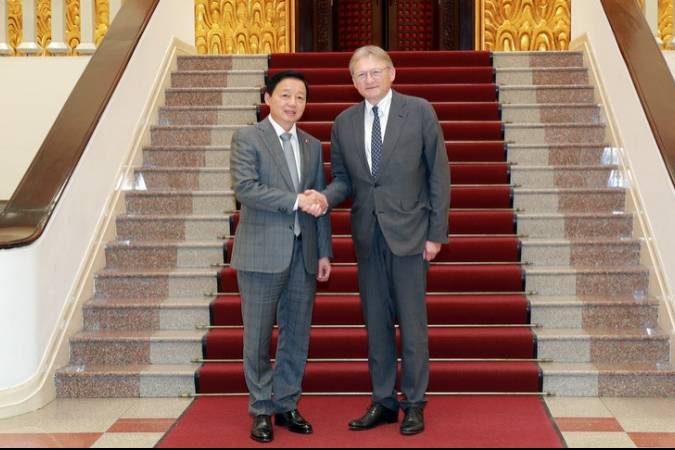On the afternoon of January 15, in Hanoi, Deputy Prime Minister Trần Hồng Hà met with Mr. Boris Yuryevich Titov, the Russian Presidential Envoy for cooperation with international organizations.
During the meeting, the Deputy Prime Minister expressed his desire for the two countries to exchange ideas and promote global cooperation initiatives to achieve better environmental protection, carbon emission reduction, and climate change mitigation goals.
During his official visit to Viet Nam from January 14–15, Russian Prime Minister Mikhail Mishustin proposed solutions such as carbon sequestration, nuclear energy combined with renewable energy, circular economy practices, and the production of green fuels. With its strong commitment to sustainable development goals, Viet Nam aims to contribute more to global efforts to address environmental and climate challenges.
Mr. Boris Yuryevich Titov shared that Russia is focusing on implementing policies to combat climate change and protect the environment to ensure sustainable development. Russia has initiated the establishment of special advisory councils on sustainable development and climate under the frameworks of the Shanghai Cooperation Organization (SCO) and BRICS to seek practical solutions for achieving sustainable development, economic growth, and climate change policies. Russia is also ready to share relevant scientific research and technologies.
 Deputy Prime Minister Tran Hong Ha met with Mr. Boris Yuryevich Titov, Special Envoy of the Russian President on cooperation with international organizations to achieve sustainable development goals (Photo: VGP/Dinh Nam)
Deputy Prime Minister Tran Hong Ha met with Mr. Boris Yuryevich Titov, Special Envoy of the Russian President on cooperation with international organizations to achieve sustainable development goals (Photo: VGP/Dinh Nam)The Russian Presidential Envoy expressed hope that Viet Nam would send experts and scientists to participate in research groups focused on carbon management technologies, green transition, and developing global standards related to carbon emission measurement and quotas. He also invited Viet Nam to share its experience in establishing carbon markets.
Deputy Prime Minister Tran Hong Ha emphasized that addressing climate change and reducing greenhouse gas emissions require fair and transparent mechanisms between developed and developing nations. He suggested that Russia should, in addition to existing initiatives, promote the establishment of research funds within BRICS and SCO to develop specific technologies for achieving Net Zero targets. These efforts should also include creating unified global tools for measuring and setting carbon emission quotas for nations.